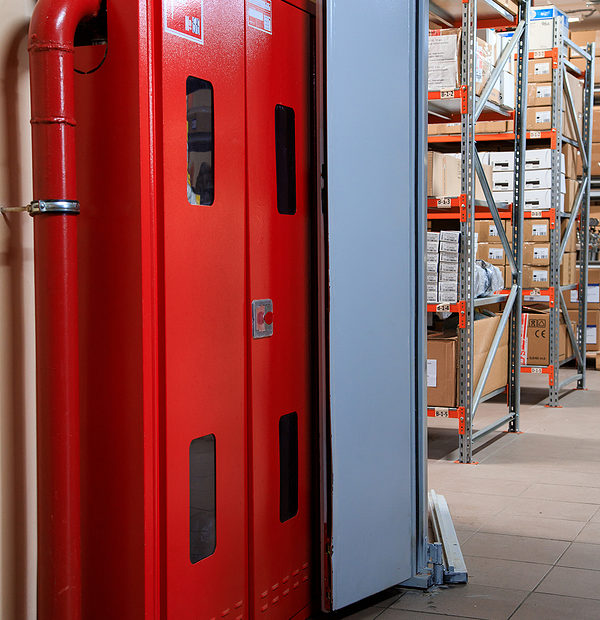A company’s warehouse is an important location for storing inventory. In them, the vast majority, if not all, of a company’s inventory is kept until it is time to sell or distribute the items. Implement these easy measures to ensure the safety of your New Mexico storage facility.
Warehouses have tremendous power because they play a vital role in protecting a company’s most crucial revenue source. Even a minor incident, like a fire, might have catastrophic results for a warehouse, potentially halting all commercial activity there.
By not taking precautions to prevent fires in the warehouse, you may be securing the doom of your company. Do not let your efforts as a warehouse owner, manager, or operator go up in smoke by not taking some basic precautions to prevent fires.
Laws Governing Fire Safety
Conducting a risk assessment following local fire safety legislation is the first step in developing the company’s comprehensive fire safety program. These steps are typical of risk assessments:
- Assess the potential for fire and make regular revisions. Locate the potential sources of fire.
- Tally up the vulnerable population.
- Calculate the potential dangers and either eliminate them or lessen them.
- Document your findings, develop a contingency strategy, and educate the public.
Methods of Fire Protection
Create specific fire safety practices for your company based on the results of your risk assessment. A self-inspection program should be implemented to ensure that housekeeping and safety procedures are always followed. Staff members should undergo training on these processes to guarantee a cohesive reaction in the case of a fire.
Emergency Equipment for Preventing Fires
To combat warehouse fires, gather as many resources as possible. Sprinkler systems, fire extinguishers, and smoke detectors fall within this category. Whatever your line of work may be, fire extinguishers should be strategically placed around the premises. The National Fire Protection Association suggests keeping one 2-A extinguisher for every 3,000 square feet in a fire involving combustible materials like wood, paper, or textiles. The Occupational Safety and Health Administration (OSHA) mandates that all workers be within 75 feet of an available extinguisher.
All workers must reach an extinguisher within 50 feet of any location where Class B flammables are kept, including workshops, storage facilities, research operations, garages, warehouses, and service and manufacturing areas.
However, the fire prevention equipment required for your warehouse will vary depending on the nature of your business. Ensure your fire safety measures are appropriate for your unique fire hazards. Implementing a blanket fire safety policy is ineffective and potentially dangerous.
Arrangements for Storing
Not having properly organized storage can increase the likelihood of a fire for several reasons. Storing dangerous products like volatile liquids with other warehouse merchandise dramatically increases the likelihood of a fire, as does the storage of flammable materials in crowded aisles that make it harder for people to escape in the event of a fire.
Keeping electrical switchgear and heating equipment away from storage, keeping items no closer than 18 inches from lighting, leaving enough space between sprinkler heads and stored goods to ensure your sprinkler system can effectively douse the area, and separating hazardous materials from nonhazardous ones are all common sense when arranging clearly defined, adequate storage. The risk of fire can be considerably reduced by using smart storage.
Electricity and Related Devices
Unseen dangers might be found in faulty electrical systems. To prevent fires and other accidents, check that the electrical systems in your warehouse have been installed and maintained properly. Ensure your electrical systems are checked and maintained regularly by a qualified electrician. If electrical problems are ignored for too long, they can cause a fire.
A Safe Haven
Warehouse fires often start because of arson. Security systems, such as alarms and cameras, can prevent would-be intruders and help keep your warehouse safe, protecting your business from this ever-present danger.
As required by law, smoking is not permitted anywhere on the premises. An outside, semi-enclosed shelter is an option for smokers. Create designated smoking areas using inflammable items. Within 20 feet of the shelter, no combustibles are permitted.
Heating the Room
Because of their large floor areas, warehouses are notoriously difficult to heat economically. Since this is the case, it’s easy to see why portable heaters would seem a better option. Don’t give in to the temptation; portable heaters pose a significantly greater fire hazard than permanent installations. Fixing a warehouse fire caused by portable heaters will much outweigh the cost of operating a permanently installed heating system.
Waste Management
A major fire hazard in your warehouse is the accumulation of trash. At the end of each workday, employees should collect all trash and take it to containers placed at least 30 feet away from any structures and at least 6 feet away from your site’s perimeter.
If this is not an option for you, it is recommended you keep your garbage in locked metal bins outside the premises.
A checkup at the Day’s End
A responsible and well-trained worker should check all warehouse areas at the end of each workday and record the findings. The inspector should ensure that all garbage has been cleared out, that the fire alarms and security systems are in working order, and that any potentially dangerous materials or devices have been properly contained.
Concluding Remarks
A comprehensive fire safety plan for a warehouse can be built on the items in this checklist. There are thousands of other options for fire safety, but the best ones will vary depending on the specific dangers present in your warehouse.
